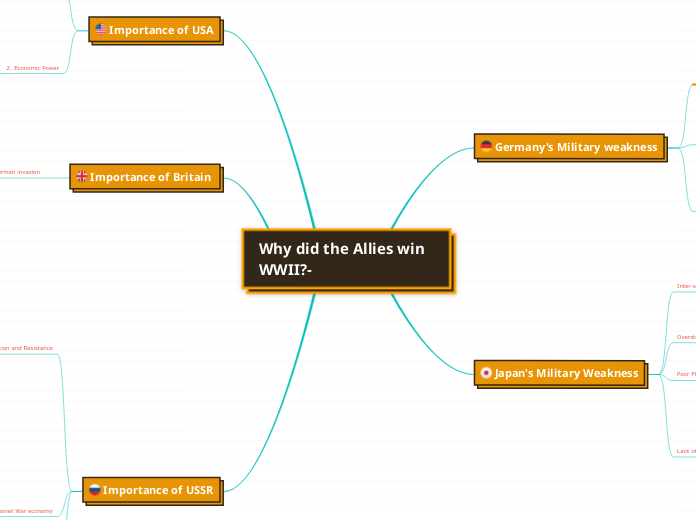Why did the Allies win WWII?-
Germany's Military weakness
Hitler's mistakes
-Hitler had little military command experience.
-Hitler attacked Stalingrad and was met with resistance from the Soviet troops
-Hitler decided to declare war on the USA
Two-front war
In 1940, Hitler fought a single-front war with Britain and France but failed to defeat Britain.
In 1941, he invaded the USSR and brought Germany to a two-front war which prevented him from concentrating on his efforts and resources.
Poor Planning
-Too many resources were invested into building giant battleships and they failed to build aircraft carriers. The ships were destroyed by Allied aircraft.
-German bombers were too small and coulldn't carry bombs
-The Germans did not invest in a radar and there was a shortage of fuel, ammunition and spare parts in the Luftwaffe.
Japan's Military Weakness
Inter-service rivalry between Army and the Navy
-In the 1930s, the army and the navy both had different goals and ideas for seizing territories to obtain resources. During war, the rivalry prevented both groups from sharing resources and exchanging military intelligence which intervened with thei attacks and defences against Allies.
Both services could not agree on where to set Japan's defensive perimeter against the Allied forces.
Overstretched empire
-Rail and road communications were poor in many areas due to the Japanese empire being very spread out, which made it difficult to deliver raw materials and workers to places they were needed.
Poor Planning
-Failed to understand that war at sea had changed.
-Japanese failed to destroy any US aircraft carriers which were more important than traditional naval power as they were not located at the Pearl Harbour during the attack, thus allowing the US to recover quickly from the attack.
Lack of Local Support
-Japanese treated people in the empire poorly, resulting in the death of millions civilians.
-Many peasants joined guerrilla bands and fought against the Japanese when their land was seized.
-The Japanese were against many communist resistance movements which included China, Vietnam, North Korea, and the Malayans. Hence, due to the lack of support from the locals, and the added trouble of the communist resistance groups, the Japanese military was weakened.
Importance of USA
Military power
Rebuilt fleet and trained troops quickly + vast resources were mobilised in a short time
People,factories,shipyards,hollywood stars joined war efforts
US supplied allies with food, raw materials, industrial equipment, weapons and ammunition, troops, ships and aircraft.
Island hopping strategy and Battle of Atlantic
using air attacks and submarines to isolate Japanese held areas. Allowed allies to incur fewer casualties and come within striking distance of Japan in a few years.
Control of shipping routes across Atlantic to Britin and to USSR for US industrial prouction.
Economic Power
War production of allies was better than Axis powers
US built 250k aircrafts, 90k tanks, 350 naval destroyers, 200 submarines, 5.6k merchant ships (1941-1945)
US supplied GMD in China with a lot of money, weapons and other aid to help fight the Japanese.
Importance of Britain
Ability to resist German invasion
Britain became a substantial military base. (New technology of radar that helped detect and locate incoming enemy aircraft, factories were effective in producing more aircraft to replace losses. Adding on, fighting over home ground gave Britain an advantage of tapping large reserves of spare parts for repair work and using less fuel for war production. Troops from all over the empire was also stationed at Britain)
the British Empire has immense manpower and resources of India. Majority fighting in Asia against the Japanese, but some in Europe and North Africa as well.
Churchill refused any kind of deal
Many politicians believed it was right for Britain to reach an agreement with Germany
Germany would've forced Britain to surrender armed forces if they agreed to a policy
Importance of USSR
Reorganisation and Resistance
Stalin and his military leaders reformed the Red Army completely after German advancement was halted by the Russian Winter in late 1941
They copied many of Germany's ideas and tactics, whill adding some of their own.
1943: Germany advanced to the city of Stalingrad.
Stalin inspired confidence and loyalty in his people, calling upon them to fight and defend Russia
The Soviets fought with them in a fierce battle and caused heavy casualities, but resulted in a victory as well after forcing the Germans to surrender by encircling them which raised the morale of Soviets.
Resources and Production: The Soviet War economy
Soviets enacted harsh measures to make sure production kept up with the high demand (Adults in the USSR received no food unless they worked for the war effort, both men and women. Forced labour was used and the secret police kept control of the population)
USSR shifted major industrial complexes to the Urals, Siberia and Kazakhastan, to muster a strong response to Germany capturing most of their agricultural and industrial capacity. 25 million workers were forced to migrate east and it contributed greatly to the war production
Britain and USA supplied vast amounts of food, raw materials and industrial equipment. E.g. USA provided USSR with over 500k motor vehicles and 1.9k locomotives and half of its supply of rubber tyres and copper
Battle of Kursk 1943: Soviets had 10 times as many tanks as Germans, more aircraft, more artillery and other weapons. E.g. rocket launchers. Soviets continued to advance forward until they reached Berlin in May 1945.
Entry to Asian Pacific Theatre of War
USSR entered the war against Japan 3 months after the defeat of Germany. August 8 1945, the Soviets declared war on Japan. They were able to defeat the Kwantung Army in Manchuria and occupy Northern Korea, contributing to Japan's decision to surrender to the Allied Forces.
